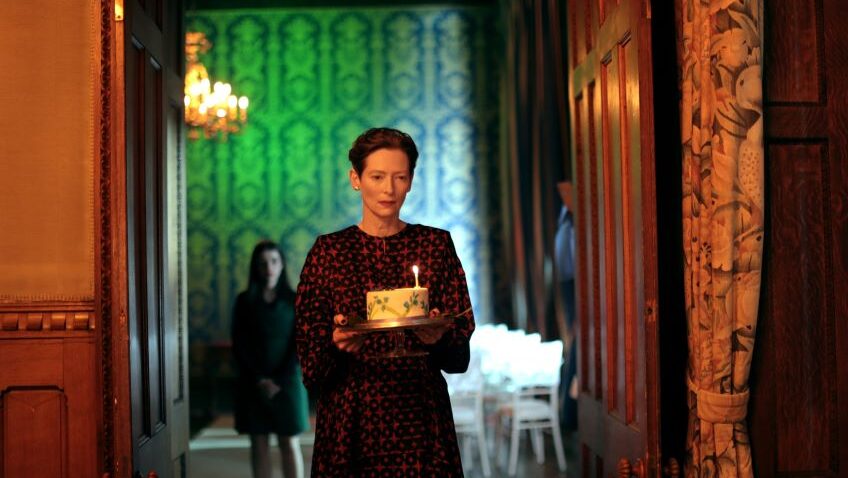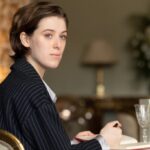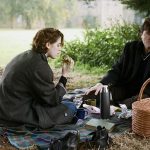Joyce Glasser reviews The Eternal Daughter (November 17, 2023) Cert 12A, 96 mins.
Mother-daughter relationships are most often a subplot in a film, but when the relationship is centre stage, as in The Joy Luck Club, Mommy Dearest, Mermaids or, to a lesser extent, Lady Bird, the conflict is explicit, even prescriptive, and the resolution a teary reconciliation or a philosophical coming-to-terms. Given the close, financially supportive mother-daughter relationship in Joanna Hogg’s film, The Souvenir – played by Tilda Swinton and her real-life daughter respectively – you might suspect she had something new to add to the genre in The Eternal Daughter.
Here Hogg eschews the prescriptive and leaves room for viewers to read their own relationships into the one portrayed on screen, turning this gothic ghost story into something personal, raw and dark. For we are all children until our mothers’ protective buffer is gone and we are alone with our memories. Yet this roominess comes at a cost to the film as the ad-libbed dialogue is not only too vague, but stilted.
A middle-aged woman named Julie, her mother Rosalind (both played by Tilda Swinton) and Rosalind’s beautiful dog Louis (Louis) take a taxi through a winterly forest landscape to an austere stately home, now the Moel Famau Hotel. (The actual location is the 1714 Soughton Hall, in Flintshire, Wales). An indifferent receptionist (newcomer Carly-Sophia Davies) tells Julie there is no record of her room reservation, although it is soon apparent there are no other guests in the hotel. Despite this Alice-in-Wonderland situation, the receptionist displays little desire to be accommodating.

Julie has chosen the hotel for a few reasons. She wants to celebrate her mother’s birthday and has learned that the hotel was, in wartime England, a family residence where her mother spent time with “a house full of children.” They are also visiting a cousin who wants to wish Rosalind a happy birthday. When he phones, however, they prefer to avoid him. Julie meets him downstairs and returns with his flowers.
But Julie has another reason. While Rosalind is addressing cards, having breakfast in bed, reading or sleeping, Julie goes off every day to a little nook with a desk to write a screenplay for her next film.
When the two meet for dinner on the first night Rosalind wonders out loud if they are early or late, as there is no one else in the dining room. The receptionist is now their waitress, no more or less welcoming than upon their arrival. The menu is limited but the food is good. The conversation is limited, too. Rosalind enquires about Julie’s day and Julie reports that she got little done.
In one of the rooms, at Julie’s prompting, Rosalind remembers more about the house and her time there. She speaks of news about Peter and how “mummy and daddy” went to the funeral but how they thought it best to leave her there. Rosalind tries to make light of what appear to be painful memories: “that’s what rooms are for; they hold stories. That was then, this is now.”
Julie feels guilty that what she thought would be a place of happy memories is the opposite, and that it isn’t her right to delve. This is something that Hogg, also a writer of autofiction or at least, autobiographical films, is grappling with here. And Swinton, Hogg’s real life school friend, played Hogg’s character’s mother before, in The Souvenir. Here, Hogg and Swinton venture into unknown territory, with Swinton playing both Hogg and her mother or perhaps a more generalised “every mother.”

Every evening Julie watches through the window as the receptionist gets into her boyfriend’s car and they speed off for the night. Presumably Julie and Rosalind are now alone in the vast creaking hotel where Julie cannot sleep. But are they? There is the noise of music from a room with no occupants. And one night, when Julie is taking the dog out, she meets the friendly caretaker Bill (Joseph Mydell). Bill has his own sad memories of the hotel. His wife, who passed away the previous year, was the chef for 37 years. He took up the flute. It’s a place where ghosts linger.
Julie tells Bill that she came to the hotel to write a film but now feels she is trespassing on her mother’s memories and life. She also worries that she has disappointed her mother. If Julie is comforted by her chat with Bill, she is taken aback when, the next day, she sees him talking with Rosalind about her: a single woman with neither a husband nor a family, and an odd profession.
For any woman who has gone away on holiday with their mother or daughter, this retreat will seem familiar. The disappointment and even guilt that the hotel was not as imagined; the eager-to-please, helpful daughter who fills the hot-water bottles; the mother who is not up to celebrating the birthday that the daughter has gone all out to organise…
Most middle-aged woman realise that they begin to resemble their mothers, physically and in other ways that they try to deny. The brilliance of the film is how it reinforces this phenomenon by casting Swinton as both the daughter and mother, differentiated by Swinton’s acting and make up and by Ed Rutherford’s photographic wizardry. The universality of this strange transition suits the eerie, creepy atmosphere that Hogg lays on thick. When Rosalind complains that she feels cold, you might also sense a chill in the room.
With all this going for it, it’s a shame that the ad-libbing is too artificial and insubstantial to be satisfying as a narrative. We haven’t learned enough about either woman to appreciate the dynamics of the relationship let alone the guilt, the fears, the regrets, the disappointments or indeed the feeling of pride. The big reveal is the ending, which you might guess, but which reframes all that you’ve just seen.




